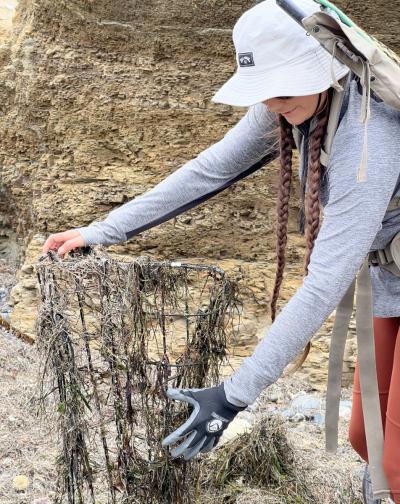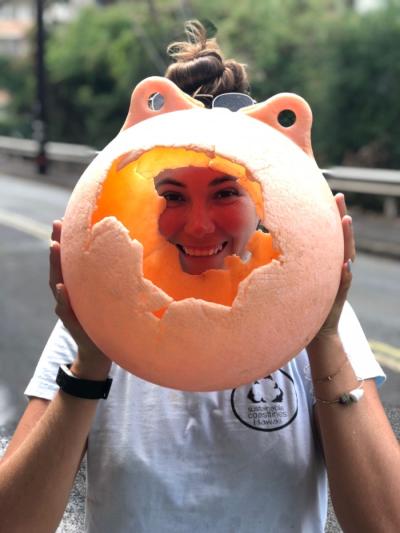Guest blog by: Tanya Torres, California Sea Grant Marine Debris Research Associate. In this blog, originally published by NOAA's Marine Debris program, she reflects on her recent Extension Fellowship with the NOAA Marine Debris Program and explains how it was a catalyst for her current position with the Sea Grant Program.
In 2020, I began my California Sea Grant Extension Fellowship with the National Oceanic and Atmospheric Administration’s (NOAA) Marine Debris Program. I was brought on to help the NOAA Marine Debris Program California Regional Coordinator implement marine debris projects and strategies in California. Over the course of my fellowship, I had the opportunity to lead a statewide marine debris action plan, support strategic internal efforts, and partake in countless professional development opportunities. Aside from the technical knowledge and skills I learned, I also gained valuable career insight about state and federal positions, teamwork and organization, and how to carry myself professionally.

A major component of my fellowship was to lead the California Ocean Litter Prevention Strategy by bringing together a broad set of the state’s marine debris community to work towards preventing and reducing the most common litter items in California. My tasks consisted mainly of stakeholder engagement, event planning, and meeting coordination of partners from local and state agencies, academia, nongovernmental organizations, and industry. In this role I also had the opportunity to meet, work with, and learn from over 50 marine debris professionals throughout the state. This broadened my understanding of the marine debris issue in California and opened my eyes to a myriad of potential career opportunities in the field of marine debris that I previously didn’t know existed.
I also became very involved in the internal operations of both the Marine Debris Program and California Sea Grant. I participated in Marine Debris Program strategic planning efforts, which was a great way to learn about all the ways the program addresses marine debris and their role as the federal lead for the issue. At the same time, California Sea Grant was in the process of rewriting their next strategic plan. Participating in the planning team gave me insight into how to draft a strategic plan and gave me a better understanding of California Sea Grant’s mission, Strategic Focus Areas, and the role California Sea Grant plays in coastal research at the state level.
One of my favorite aspects of this fellowship was the emphasis on professional development opportunities. I was highly encouraged to take trainings, attend conferences, and sign up for as many workshops as I could to equip myself with the skills I desired and needed. I now have certifications and have been trained in various aspects of marine debris work, such as zero waste practices, solid waste management, ocean advocacy, facilitation, indigenous stewardship, California laws and policies, and behavior change campaigns. I also had the opportunity to present at national and international conferences, remove debris from the remote Channel Islands, and surround myself with equally passionate and dedicated mentors and colleagues.

I am so grateful I had the opportunity to learn and be involved with two enthusiastic, collaborative, and supportive programs under NOAA. This experience has improved my confidence as a young professional, guided my career path, and has certainly prepared me for my next chapter and future career. I am thrilled to be hired on with California Sea Grant as their new Marine Debris Research Associate and can’t wait to continue to bridge the partnership between the federal and state efforts addressing marine debris in California.
Tanya received her Master’s degree in Natural Resources and Environmental Management from the University of Hawaiʻi at Mānoa, where she researched the environmental impacts, benefits, and tradeoffs of locally produced food versus imported foods. Throughout her academic career, she volunteered with a local non-profit beach cleanup organization, where she cleaned up marine debris and educated her community on the issue. These experiences and passions guided her to her California Sea Grant Extension Fellowship with the NOAA Marine Debris Program.
If you’re interested in learning about the California Sea Grant Program, fellowship opportunities, or my current marine debris work, reach out to Tanya Torres at tatorres@ucsd.edu.